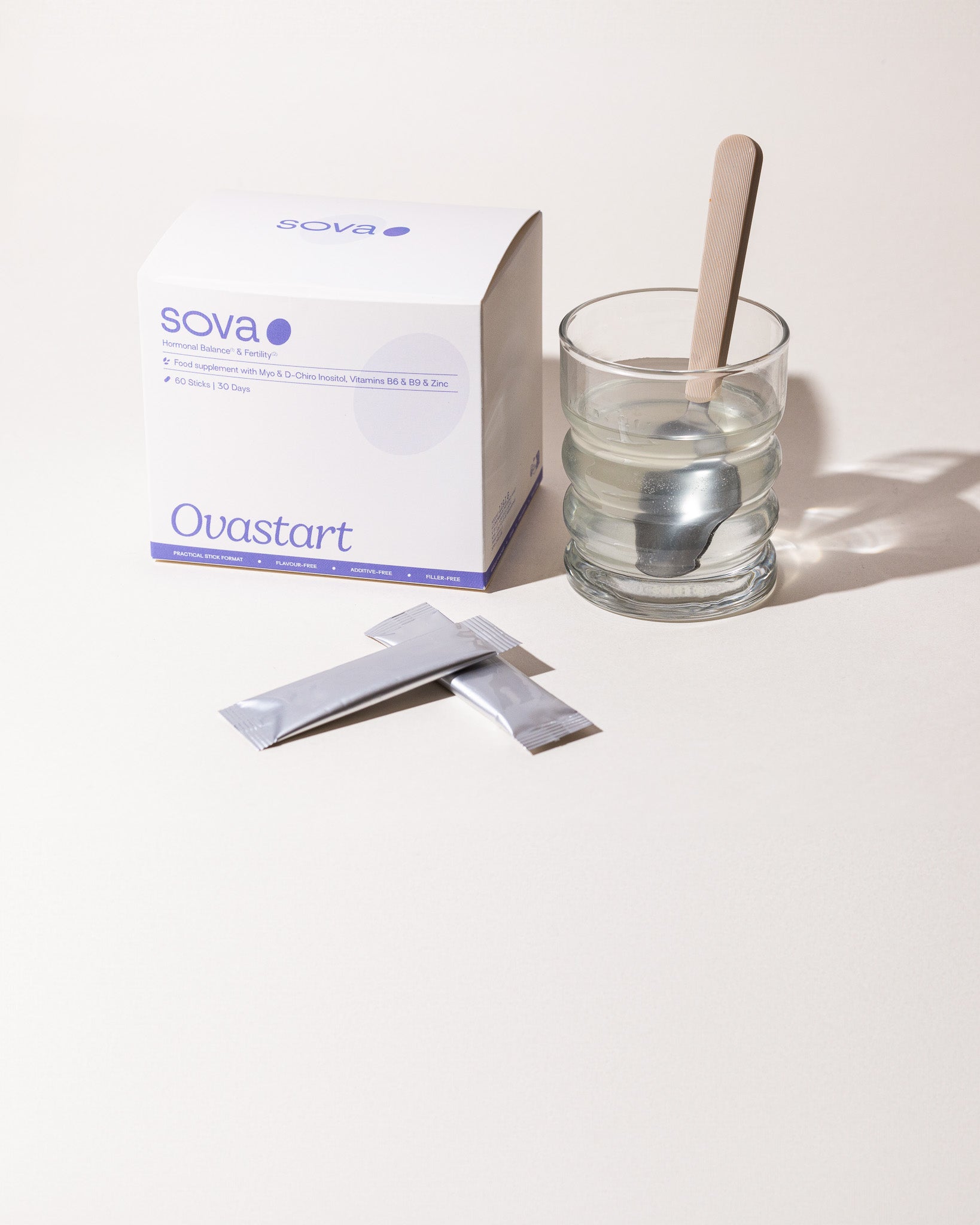Table of contents
The reason we call menstruation “periods” reflects their recurring and regular nature. Yet sometimes, cycles can become irregular. Irregular periods are actually a common symptom of a condition called PCOS (Polycystic Ovary Syndrome), although other causes can also lead to irregular menstrual cycles.
To support you, we’ve put together this article to help you better understand what we mean by irregular periods, what the possible causes are, and what can help. And if you’d like to go further, you can also check out our dedicated article on the absence of periods and PCOS!
Irregular periods: understanding the basics
What is a menstrual cycle?
The menstrual cycle is the series of physical and hormonal changes that take place between the first day of your period and the day before the next one begins. It’s a true hormonal cascade: starting with menstruation, moving into follicle development leading to ovulation, and then the post-ovulatory (or premenstrual) phase (1).
Menstruation refers to the natural bleeding that happens cyclically and usually lasts between 3 and 6 days.
What is an irregular menstrual cycle?
A typical menstrual cycle is considered to last between 21 and 35 days. When we talk about irregular periods, we usually mean cycles that don’t follow a predictable pattern — whether in terms of length, flow, or symptoms. Most often, it’s the length of the cycle that determines regularity. A cycle is generally considered irregular if it differs by more than 5 days compared with your usual pattern.
For example: if your cycle usually lasts 30 days but the next one is 36 days, that variation is enough to call it an irregular cycle. No need to panic if it happens occasionally — a small shift is quite common and often harmless. It may be linked to stress, lifestyle changes, or other temporary factors.
Irregular periods: when should you worry?
It’s recommended to see your gynaecologist or midwife if your periods are spaced more than 40 days apart, or if the bleeding or pain feels unusually heavy.
In adolescence, during the years following your first period, it’s common for cycles to take time to settle. Irregular periods at this stage aren’t necessarily concerning if they’re not accompanied by other symptoms (2).
As you approach menopause, hormonal activity gradually declines, and periods naturally become less regular until they stop altogether.
Whenever in doubt, always consult a healthcare professional.
Irregular periods: what are the causes?
So why are some cycles longer or shorter than others? Variations in cycle length are mainly due to differences in the follicular (pre-ovulatory) phase or the luteal (premenstrual) phase.
-
When a cycle is short, it often means ovulation happened earlier than usual, or the luteal phase was too short.
-
When a cycle is long, it usually means ovulation was delayed — possibly due to internal (hormonal or medical) or external (lifestyle-related) factors.
It’s important to know that, outside of pregnancy, the luteal phase never exceeds 14 days. However, it can be shortened in cases of hormonal imbalance.
That’s why tracking your cycle is such a powerful way to better understand what’s happening in your body.
Hormonal causes of irregular periods
Adolescence and perimenopause
Certain life stages naturally impact cycle regularity. During adolescence, the brain–ovary connection can take time to mature, making irregular periods common without necessarily pointing to a medical issue.
Later in life, perimenopause is also marked by a loss of cycle regularity. This transitional phase leading to menopause comes with a gradual decline in the sex hormones that regulate the menstrual cycle, such as oestrogen and progesterone. Often referred to as a “second puberty” because of the intense hormonal fluctuations, perimenopause typically brings increasingly irregular periods until they stop completely — one year after your final menstrual bleed. For some women, this transition can happen prematurely, in which case it’s called premature ovarian insufficiency or early menopause.
PCOS (Polycystic Ovary Syndrome)
Irregular menstrual cycles are one of the most common symptoms of PCOS. In fact, it’s often the irregularity of the cycles that raises a red flag and leads to a possible PCOS diagnosis. On average, gynaecologists wait 6 to 8 years after a girl’s first period before confirming PCOS.
Polycystic Ovary Syndrome affects the body in several ways. Excess production of androgens (male hormones) disrupts follicle maturation, which is essential for ovulation, while also increasing LH — which further stimulates androgen production. A real vicious cycle.
Another very common component of PCOS is insulin resistance, which also plays a key role in irregular periods. It increases androgen production and decreases SHBG, a protein that binds to androgens like testosterone to limit their activity.
👉 Want to dive deeper? Check out our full article on PCOS.
The thyroid
The thyroid plays a key role in the body’s overall balance, including hormone regulation. In cases of significant thyroid dysfunction, some people may experience irregular menstrual cycles, especially with severe hypothyroidism.
That said, the link isn’t automatic: many women with thyroid issues continue to have regular cycles.
Medical causes
In some cases, benign growths such as polyps or fibroids can trigger irregular bleeding, often with shorter cycles. These symptoms aren’t normal and should always lead you to consult a healthcare professional. The good news? They’re usually detected and ruled out quickly during early gynaecological check-ups, often with a simple ultrasound.
External factors
When medical causes have been excluded, lifestyle factors are often worth looking into. If you experience irregular periods, pay close attention to:
-
Nutrition: imbalances in your diet can affect the brain–ovary connection and hormone production. For example, eating disorders such as anorexia can disrupt the menstrual cycle.
-
Exercise: an imbalance between food intake and energy expenditure can signal “danger” to your body. If it senses that you’re burning too much energy, it may try to conserve resources by delaying or stopping ovulation — which can lead to longer and more irregular cycles. This phenomenon, known as RED-S (Relative Energy Deficiency in Sport), is common among athletes but can affect anyone whose food intake doesn’t match their activity level (3).
-
Stress: chronic or intense stress can destabilise the brain–adrenal axis and lead to excessive cortisol release. When stress hormones remain high for too long, they can interfere with the gonadotropins essential for ovulation. This is especially true for women with pre-existing hormonal sensitivities (such as fatigue, eating disorders, or other imbalances). Short-term stress usually doesn’t delay periods, but in extreme circumstances — like famine, war, or major trauma — some women may stop menstruating altogether. This is called functional hypothalamic amenorrhoea.
Another less well-known factor is circadian rhythm disruption. Studies show that women who work night shifts, for example, may experience changes in LH secretion, which is crucial for ovulation. And as you know, the later ovulation happens, the later your period arrives — making cycles longer and irregular.
Irregular periods: natural solutions to restore balance
You’ve probably realised by now that irregular cycles are often linked to factors that interfere with ovulation. The most important step is to consult a healthcare professional to identify the cause. If you’d like guidance on which specialist to see, we’ve got an article dedicated to that.
Alongside medical advice, you can also take a closer look at your lifestyle. While these factors aren’t always the direct cause of irregular periods, they can provide valuable support — especially if your system is already under strain. The good news: there are simple things you can start doing today to support hormonal balance and encourage more regular cycles.
Nutrition
The first question to ask yourself is whether your food intake is sufficient — both in terms of quantity and quality.
By quantity, we don’t mean overeating, but simply making sure you feel satisfied after meals and that you’re not skipping meals. Insufficient food intake can also mean eating too few carbohydrates, which directly disrupts brain–ovary communication, even if your calories and weight seem “normal.”
By quality, we mean balanced meals that include:
-
Proteins: meat, fish, eggs, legumes, tofu, etc.
-
Healthy fats: olive oil, avocado, seeds, nuts, butter, ghee…
-
Carbohydrates: quinoa, rice, sweet potatoes…
-
Vegetables: to provide the vitamins and minerals (like vitamin C, magnesium, etc.) your body needs.
Exercise
Too much exercise can delay or even stop ovulation — a phenomenon often seen in athletes.
If this sounds like you, it might be time to ease up and adapt your routine to your energy levels. You can alternate intense workouts with gentler activities like yoga, add more rest days, go to bed earlier, and allow yourself downtime during the day.
Stress management
Stress can significantly impact cycle regularity, especially when it’s intense, chronic, or adds to an already fragile system. Stress acts directly on the hormonal command centre in the brain, reducing brain–ovary communication. This can lower FSH and LH levels, which are key to ovulation.
For example, one study showed that nurses working in high-stress environments or reporting high stress levels were more likely to experience longer cycles.
If you think stress might be affecting your cycle, here are some simple tools that can help:
-
Take time for yourself and activities that bring you joy — dancing, gardening, painting, knitting, anything!
-
Try breathing techniques such as coherent breathing.
-
Practise calming activities like yoga or walking in nature.
Supplements
Certain supplements can also help restore a more regular menstrual cycle by addressing underlying imbalances. Of course, they should always be seen as complementary to medical advice and lifestyle adjustments.
-
B vitamins (especially B6, B9, and B12) play an important role in hormonal balance and cell regulation. At SOVA, we use active forms of B vitamins in Ovastart to ensure better absorption.
-
Magnesium supports relaxation and reduces fatigue — helpful if your irregular cycles are linked to stress or exhaustion.
-
Inositol contributes to normal menstrual cycles. A study on women with irregular periods showed that supplementation with myo-inositol and D-chiro-inositol improved both cycle regularity and insulin sensitivity (4).
-
Zinc is another key mineral for menstrual health. Research shows that zinc deficiency is common in women with PCOS and that it may play a role in reducing insulin resistance, a frequent factor behind irregular cycles (5).
Whatever the reason, irregular periods are a sign that something in your body isn’t working as it should — since the menstrual cycle is a reflection of overall health. Regaining regular cycles can take time, so be patient with yourself, and don’t hesitate to consult a professional if you’re unsure.
Scientific references
SOVA was created by two sisters with PCOS who wanted products that truly worked. Our formulas are developed in-house with women’s health and micronutrition experts, using ingredients backed by clinical studies and compliant with European regulations.
- Built by women with PCOS, we know the reality of the symptoms.
- Clinically studied, high-quality ingredients, including patented forms like Quatrefolic® and an optimal Myo-/D-Chiro Inositol ratio.
- Holistic support for hormonal balance, metabolic health, inflammation, mood and cycle regulation.
- Transparent, science-led formulas with no unnecessary additives.















